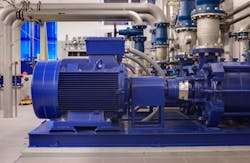New standards for commercial and industrial pumps have been proposed by the U.S. Department of Energy (DOE) with the aim of improving energy efficiency.
The proposal would establish the first-ever U.S. energy conservation standards for rotodynamic, clean water pumps, which are used in a variety of commercial, industrial, agricultural and municipal applications including water and wastewater treatment and building heating and cooling systems.
According to a blog post by Meg Waltner of the Natural Resources Defense Council, the least-efficient 25 percent of pumps on the market would fail to meet the new standards.
The proposed measures would save about 30 billion kilowatt-hours from pumps sold over the next 30 years. That's equivalent to the electricity used by 2.8 million U.S. households each year. Carbon emissions would be reduced by 16 million metric tons.
For industry, the new standards would produce up to $1.1 billion in net operating-cost savings from pumps sold in the next 30 years. Life cycle cost savings for most pump types would range from $92 to $173 per pump.
Manufacturers will have four years to meet the new standards after the final rule is published, which is expected to be later in 2015. They can either make design improvements to improve efficiency or choose to drop inefficient pumps from their product line.
The proposed standards are supported by both industry and efficiency campaigners.


